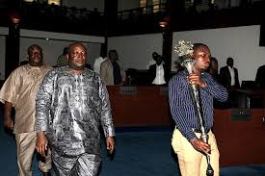Archive for July, 2013
A Constitutional Analysis Of The Rivers State Legislative Crisis
Posted by legalistiq in Uncategorized on July 16, 2013
On Tuesday the 9th of July, 2013, proceedings at the Rivers State House of Assembly were interrupted by a violent mob of thugs, security agents and politicians. Video clips of the episode (available here), strewn all over social media tell a gory tale of mayhem at the Rivers State House of Assembly located at No. 3 Forces Avenue, GRA Phase III, Port Harcourt, Rivers state.
The House of Assembly Plenary Session devolved into a free-for-all following an attempt by 5 members of the House of Assembly, to impeach the Speaker of the House of Assembly, Mr. Otelemabe Amachree. On Wednesday 10th July, 2013 the Federal House of Representatives voted in favor of a motion to “take over the functions of the State House of Assembly”. The motion was moved pursuant to Section 11 (4) of the 1999 Constitution of the Federal Republic of Nigeria (as amended) called on the Lower House to intervene and declare what has now been termed as a “Legislative State of Emergency”.
Section 4 (1) of the 1999 Constitution vests the legislative powers of the Federal Republic of Nigeria in the National Assembly. Section 47 of the same Constitution divides the National Assembly into the Senate and the House of Representatives. The Senate consists of 3 Senators per State, and 1 Senator representing the FCT making a total of 109 members. The House of Representatives has 360 members representing constituencies of nearly equal proportions from each state of Nigeria including the FCT.
The legislative powers of a state are vested in the State House of Assembly, by virtue of section 4 (6) of the 1999 Constitution. Unlike the Federal Legislature, the seats in a State House of Assembly are not constitutionally restricted to a specific number, provided that a State House of Assembly shall consist of not less than twenty-four and not more than forty members (Section 90, 1999 Constitution). Under our Federal system, the various tiers of Government enjoy a restrictive form of autonomy by which the States are largely dependent on the Federal Government.
Section 11 (4) and (5) of the 1999 Constitution provide that
(4) At any time when any House of Assembly of a State is unable to perform its functions by reason of the situation prevailing in that State, the National Assembly may make such laws for the peace, order and good government of that State with respect to matters on which a House of Assembly may make laws as may appear to the National Assembly to be necessary or expedient until such time as the House of Assembly is able to resume its functions; and any such laws enacted by the National Assembly pursuant to this section shall have effect as if they were laws enacted by the House of Assembly of the State:
Provided that nothing in this section shall be construed as conferring on the National Assembly power to remove the Governor or the Deputy Governor of the State from office.
(5) For the purposes of subsection (4) of this section, a House of Assembly shall not be deemed to be unable to perform its functions so long as the House of Assembly can hold a meeting and transact business.
The sovereignty of a State is sacred; therefore this section contains certain preconditions for its operation.
Firstly, before this section can be activated, the House of Assembly must have been unable to perform its law-making functions. Section 11 (5) of the Constitution states that the situation described in subsection (4) will only arise when the House of Assembly cannot hold a meeting and transact business. This fact cannot be determined in one or two days. An interruption of State function this grave cannot be the product of a hasty or rash decision.
Secondly, only the National Assembly as an organ can intervene in the business of a State House of Assembly. Consequently, neither the Senate, nor the House of Reps can intervene independently under Section 11 (4) in any way or form. Consequently, any law made pursuant to this subsection can only be validly enacted following the constitutional process of law-making in the State, to the Governor’s assent.
Thirdly, the only manner of intervention contemplated by the Constitution is in the enactment of laws for the peace, order and good government of that State. This appears to be the only situation under the Constitution where one arm of Government at the Federal level can unilaterally interfere with the legislative sovereignty of a State. In this situation, the State’s legislative integrity is preserved by the National Assembly. The wording of the subsection presupposes considerable interaction between the State and the Federal legislature; hence the interregnum is only operative until such time as the House of Assembly is able to resume its functions. Thus it is the intervention of the House of Assembly that will bring the interference to an end.
Finally, the National Assembly does not enjoy unlimited legislative power under this subsection in that it cannot impeach either the Governor or Deputy Governor.
In essence, Section 11 (4) simply provides for a situation where the National Assembly may intrude in the sovereignty of a State by enacting laws for the peace, order and good governance of the State. It is interesting that nowhere in the subsection does the Constitution use the phrase “Take-over” bandied around carelessly thereby suggesting an oversight function by the National Assembly.
If the sparse number of Bills that have been passed into law by the 7th National Assembly inaugurated since the 6th of June, 2011 is anything to go by, the sudden fervor to ‘takeover’ legislative control is indeed curious. The Constitution empowers the National Assembly to function under the subsection when a House is unable to transact the business of legislation. In spite of the sordid display enacted on Tuesday 9th of July, 2013, there however doesn’t seem to be a break in transmission at the Rivers State House of Assembly.
The language of Democracy must be subservient to the Rule of Law. Federal Legislature must cautiously refrain from soliciting cheap publicity or further turning the Rivers State incident into a theatre of the absurd by making rash statements.
According to the Senate President, “Clearly, what is happening in Rivers State is an embarrassment to legislators across the length and breadth of this country.”
